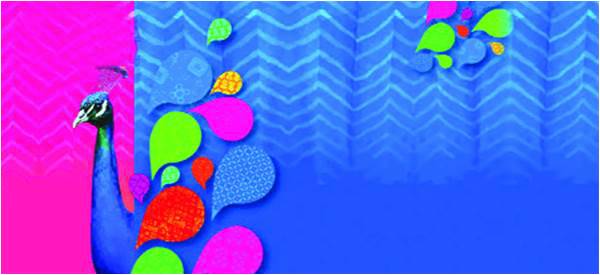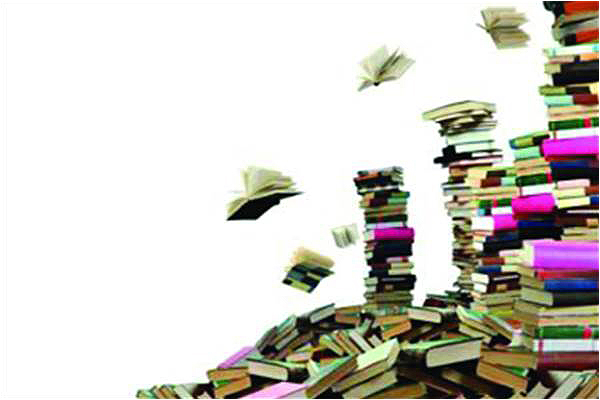
All my life, I’ve dreamt of being a writer. When my first book was published, some twenty years after I completed my first hack-job, I discovered a world I gave up when I retired at 25 – a world where you’re flown around and put up, where you get to showcase your entire wardrobe in three days with other awkward specimens of humanity before returning to your warren and seven sets of pyjamas, where people ask to interview you, where you meet people who make you consider sending out Facebook friend requests. I love this world, I really do.
I love being offered tea and coffee by student volunteers. I love being escorted to the authors’ lounge. I love it even more because of the signboard that says ‘AUTHORS ONLY’. I’ve learnt to draw myself up to my full height of 5’11” (I wear sarees to camouflage the heels) and say archly that I’m not a volunteer, when someone asks me where the restroom is. I’ve perfected a silvery laugh for people who take me for Anita Nair or Arundhati Roy or Nadeem Aslam – we curly-haired people are unaware that we all look alike.
My decade-long stint with the stage stands me in good stead when I meet writers whose books I’ve devoured since I turned an ancient (and pretentious) fourteen, ushered prematurely into nihilism by the Russians. While fangirl-gushing in my head, I have more-or-less dignified, sarcastic conversations about being disturbed by phone calls and coffee-seekers when we’re writing (or watching re-runs of Seinfeld).
[quote]A subcontinental lit fest is essentially a Bollywood film[/quote]
Now that that long politically correct spiel is done with, let me declare my thesis – a subcontinental lit fest is essentially a Bollywood (or Lollywood, if you please) film. There’s the prodigal son – or several prodigal spawn, depending on how many émigré writers are holidaying in the land they were born in. There are reunions, prizes, villains in the audience, an India-Pakistan angle, music, and a literary item number. Some people get laid.
A veteran of three literature festivals, I’ve resigned myself to being typecast. Most women writers have. We’re usually thrown into a panel that must discuss how difficult the modern world is for women – usefully, there’s nearly always been a high-profile rape or murder sometime before, which makes the session topical. Ideally, this session must have two women who want to castrate all men, two who write chick lit, and two whom no one has heard of, or is unsure what to do with. I usually belong to the last category. It may be because my book has been classified by the masses as ‘non-fiction novel’ and ‘semi-fiction’, two genres that I wasn’t aware existed.
Of course, there’s the Pakistan special in Indian lit fests, and from what I know of Pakistani hospitality, I’m sure this is reciprocated in Lahore and Karachi. This comprises a Pakistani author, an Indian Muslim author, someone else – a former bureaucrat who has served in Pakistan, a relative of the said bureaucrat, someone who has flown over Pakistan, or knows a Pakistani – and a woman who will cross and uncross her legs between vague questions.
This session is meant to discuss the difficulty of negotiating roadside bombs while going from one’s home to one’s writing hovel (which may be a bomb shelter). Often, one of the panellists is denied a visa, making for the perfect conversation starter. Occasionally, they join in on Skype, and the connectivity issues ensure that the session doesn’t get too heavy. It does get emotional, though. The panel laments the fact that Pakistan was formed. The token Pakistani laments it most. Finally, someone quotes an aphorism in Urdu, and everybody sighs.

You see, anything in Urdu can sound romantic and melancholy and beautiful, especially to those who don’t understand it too well. In India, it has aspiration value for liberals. So, you could say, “I have a nosebleed” in Urdu, and people would lose themselves in its metaphorical connotations. This is especially true if Gulzar says it.
That brings me to the item number. Where does literature meet cinema? Ideally, in Gulzar or Javed Akhtar. A second option is someone from ‘alternate cinema’ – basically, someone who gets paid less than the Khans to do commercial cinema, and reconciles himself or herself to this by acting on stage.
And then, there is the evening entertainment – there are always writers who sing. Trained by their writing careers, they are grateful for the showcase and will not demand money, which cuts costs for the organisers. Trained by marketing experience, the organisers will not bring this up, and instead say it is to keep the event literary.
There are always some panellists who make you wonder how they got there. I’ve moderated a session about pulp fiction, in which one of the speakers was an academic, who suggested I ask her about romance in literature. Over the next fifteen minutes, the auditorium lost half its population, and my eyes glazed over. When I came to, I began to write new stand-up material, while frowning intelligently and nodding.
Thankfully, the evening parties have enough alcohol to dissolve all memories of the day. Queuing up at the bar gave me another nugget for posterity, though – the sight of Chetan Bhagat cutting ahead of me to say, “Yaar, ek Black Dog dedo.”
I love being offered tea and coffee by student volunteers. I love being escorted to the authors’ lounge. I love it even more because of the signboard that says ‘AUTHORS ONLY’. I’ve learnt to draw myself up to my full height of 5’11” (I wear sarees to camouflage the heels) and say archly that I’m not a volunteer, when someone asks me where the restroom is. I’ve perfected a silvery laugh for people who take me for Anita Nair or Arundhati Roy or Nadeem Aslam – we curly-haired people are unaware that we all look alike.
My decade-long stint with the stage stands me in good stead when I meet writers whose books I’ve devoured since I turned an ancient (and pretentious) fourteen, ushered prematurely into nihilism by the Russians. While fangirl-gushing in my head, I have more-or-less dignified, sarcastic conversations about being disturbed by phone calls and coffee-seekers when we’re writing (or watching re-runs of Seinfeld).
[quote]A subcontinental lit fest is essentially a Bollywood film[/quote]
Now that that long politically correct spiel is done with, let me declare my thesis – a subcontinental lit fest is essentially a Bollywood (or Lollywood, if you please) film. There’s the prodigal son – or several prodigal spawn, depending on how many émigré writers are holidaying in the land they were born in. There are reunions, prizes, villains in the audience, an India-Pakistan angle, music, and a literary item number. Some people get laid.
A veteran of three literature festivals, I’ve resigned myself to being typecast. Most women writers have. We’re usually thrown into a panel that must discuss how difficult the modern world is for women – usefully, there’s nearly always been a high-profile rape or murder sometime before, which makes the session topical. Ideally, this session must have two women who want to castrate all men, two who write chick lit, and two whom no one has heard of, or is unsure what to do with. I usually belong to the last category. It may be because my book has been classified by the masses as ‘non-fiction novel’ and ‘semi-fiction’, two genres that I wasn’t aware existed.
Of course, there’s the Pakistan special in Indian lit fests, and from what I know of Pakistani hospitality, I’m sure this is reciprocated in Lahore and Karachi. This comprises a Pakistani author, an Indian Muslim author, someone else – a former bureaucrat who has served in Pakistan, a relative of the said bureaucrat, someone who has flown over Pakistan, or knows a Pakistani – and a woman who will cross and uncross her legs between vague questions.
This session is meant to discuss the difficulty of negotiating roadside bombs while going from one’s home to one’s writing hovel (which may be a bomb shelter). Often, one of the panellists is denied a visa, making for the perfect conversation starter. Occasionally, they join in on Skype, and the connectivity issues ensure that the session doesn’t get too heavy. It does get emotional, though. The panel laments the fact that Pakistan was formed. The token Pakistani laments it most. Finally, someone quotes an aphorism in Urdu, and everybody sighs.

You see, anything in Urdu can sound romantic and melancholy and beautiful, especially to those who don’t understand it too well. In India, it has aspiration value for liberals. So, you could say, “I have a nosebleed” in Urdu, and people would lose themselves in its metaphorical connotations. This is especially true if Gulzar says it.
That brings me to the item number. Where does literature meet cinema? Ideally, in Gulzar or Javed Akhtar. A second option is someone from ‘alternate cinema’ – basically, someone who gets paid less than the Khans to do commercial cinema, and reconciles himself or herself to this by acting on stage.
And then, there is the evening entertainment – there are always writers who sing. Trained by their writing careers, they are grateful for the showcase and will not demand money, which cuts costs for the organisers. Trained by marketing experience, the organisers will not bring this up, and instead say it is to keep the event literary.
There are always some panellists who make you wonder how they got there. I’ve moderated a session about pulp fiction, in which one of the speakers was an academic, who suggested I ask her about romance in literature. Over the next fifteen minutes, the auditorium lost half its population, and my eyes glazed over. When I came to, I began to write new stand-up material, while frowning intelligently and nodding.
Thankfully, the evening parties have enough alcohol to dissolve all memories of the day. Queuing up at the bar gave me another nugget for posterity, though – the sight of Chetan Bhagat cutting ahead of me to say, “Yaar, ek Black Dog dedo.”

